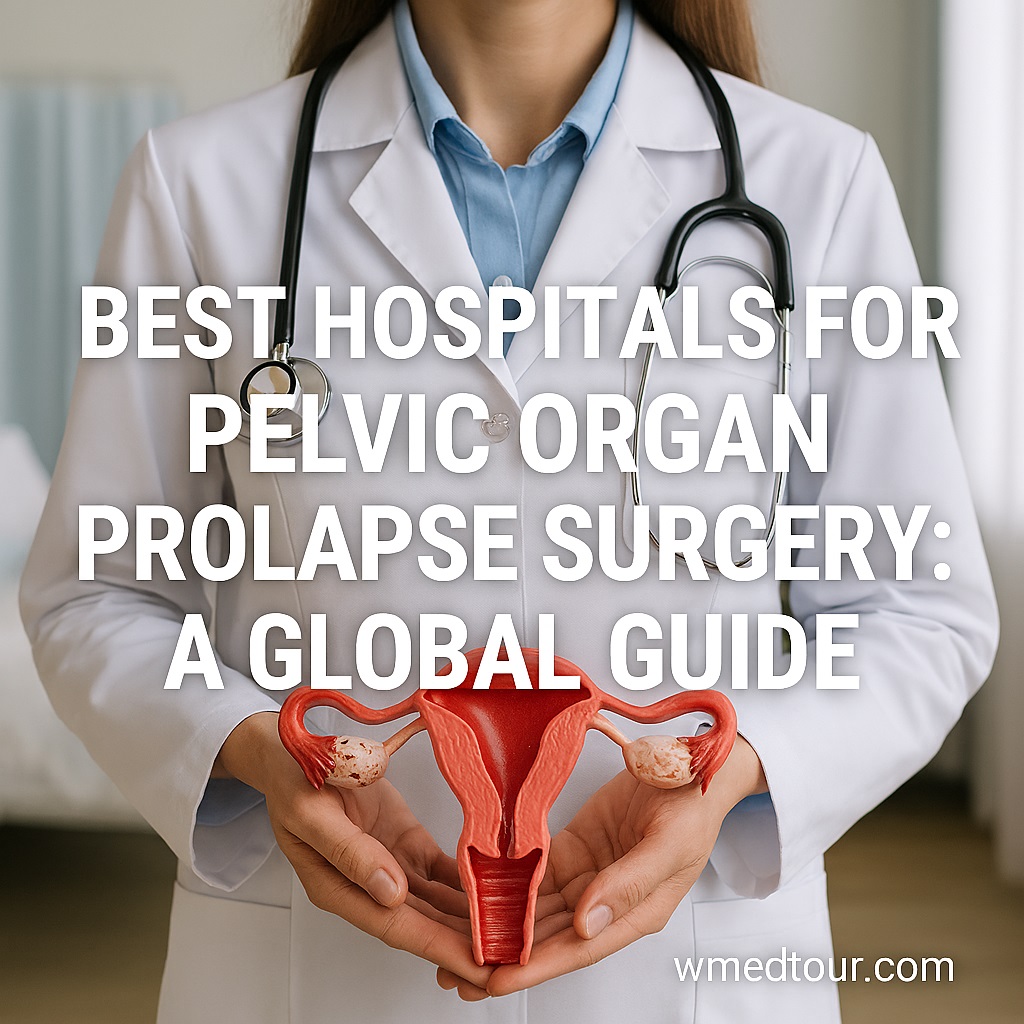Best Hospitals for Pelvic Organ Prolapse Surgery: A Global Guide
For many women, pelvic organ prolapse (POP) can be a challenging and uncomfortable condition. It occurs when the pelvic floor muscles and tissues weaken, causing organs like the bladder, uterus, or rectum to drop into the vagina. Furthermore, while lifestyle changes and physical therapy can help in early stages, surgery often becomes the most effective and definitive treatment. As a result, finding the **Best Hospitals for Pelvic Organ Prolapse Surgery** is a critical first step on your journey to recovery. This guide will walk you through what to look for in a world-class hospital and help you find the right care.
First and foremost, it’s essential to understand that not all hospitals offer the same level of expertise. In fact, many medical centers are general in nature and may lack a dedicated team of urogynecologists, specialists who focus on pelvic floor disorders. Therefore, finding a hospital with a specialized center of excellence can make a significant difference in your surgical outcomes and long-term quality of life. In addition, selecting the right hospital is about more than just a famous name; it involves evaluating its specific experience, technology, and patient care philosophy.
Understanding Pelvic Organ Prolapse and Treatment Options
Pelvic organ prolapse is a common condition that affects millions of women worldwide. It can cause a range of symptoms, including pelvic pressure, urinary incontinence, and sexual discomfort. Furthermore, while there are different stages of prolapse, the treatment options are varied. Non-surgical options include pessaries, which are medical devices inserted into the vagina, and pelvic floor muscle training. However, for more advanced prolapse, surgical intervention is generally the most effective way to restore the pelvic organs to their proper position.
Types of POP Surgery and Techniques
Surgical approaches for POP vary depending on the specific organs involved and the severity of the prolapse. For example, some procedures use a patient’s own tissues to repair the pelvic floor, while others may utilize surgical mesh. In recent years, minimally invasive techniques such as laparoscopic and robotic-assisted surgery have become standard. These methods offer several advantages, including smaller incisions, less pain, and a faster recovery time compared to traditional open surgery. Consequently, when searching for the **Best Hospitals for Pelvic Organ Prolapse Surgery**, inquire about their experience with these modern techniques.
What Makes a Hospital the “Best” for Pelvic Organ Prolapse Surgery?
Selecting a hospital is a deeply personal decision, but several key factors indicate a high level of expertise and quality. First, look for hospitals that are recognized for their urogynecology or women’s health programs. These designations often signify a commitment to specialized care and research. Second, consider the volume of procedures a hospital performs. High-volume centers often have more experienced surgeons and better overall outcomes. For instance, a hospital that performs several hundred POP surgeries a year is likely more experienced than one that performs only a handful.
The Importance of a Multidisciplinary Team and Technology
Another crucial factor is the presence of a multidisciplinary team. The **Best Hospitals for Pelvic Organ Prolapse Surgery** will have a team that includes not just surgeons, but also physical therapists, nurse practitioners, and pain management specialists. This collaborative approach ensures that you receive holistic care, from diagnosis to post-operative recovery. Furthermore, state-of-the-art technology is a significant advantage. Hospitals that invest in advanced imaging equipment and robotic surgical systems demonstrate a commitment to providing the most effective and safest treatment options available. You can read more about surgical teams from the American College of Surgeons.
Leading Hospitals and Centers of Excellence Globally
While we cannot provide a definitive list, several hospitals and medical centers worldwide are widely recognized for their excellence in urogynecology and pelvic reconstructive surgery. These institutions often serve as referral centers for complex cases and are at the forefront of research and innovation. For instance, in the United States, places like the Cleveland Clinic and Mayo Clinic are known for their comprehensive women’s health programs. Similarly, world-class centers in countries such as the United Kingdom, Germany, and Thailand attract international patients for their specialized expertise and advanced care.
The best hospitals for pelvic organ prolapse surgery often have a strong focus on patient education and support. Therefore, they will provide you with all the information you need to make an informed decision and prepare for your surgery. In addition, many of these hospitals are actively involved in clinical trials and research, which means they can offer access to the latest treatments and techniques. As a result, choosing a center like this can give you confidence in your care. You can find more information on clinical trials from the National Institutes of Health.
Choosing the Right Surgeon for Your POP Surgery
Although the hospital is important, the surgeon you choose is arguably the most critical factor in your success. You need a surgeon with extensive experience in pelvic reconstructive surgery. Consequently, always ask about your surgeon’s credentials and experience. Look for a board-certified urogynecologist with specific fellowship training. It’s also wise to ask about their patient outcomes, including success rates and complication rates for the specific procedure you need. Furthermore, a good surgeon will take the time to answer all your questions and explain the risks and benefits of all your options.
Key Questions to Ask Your Surgeon
When you have your consultation, come prepared with a list of questions. For example, ask about the number of pelvic organ prolapse surgeries they perform each year. Also, inquire about their preferred surgical techniques and why they recommend a specific procedure for your case. Finally, ask about the expected recovery time and what kind of post-operative care and follow-up they provide. By having an open and honest conversation with your surgeon, you can build trust and feel more confident about your treatment plan. The American College of Obstetricians and Gynecologists is a great resource.
Navigating Global Medical Tourism for POP Surgery
Many patients consider traveling abroad to find the **Best Hospitals for Pelvic Organ Prolapse Surgery**. In fact, medical tourism can offer access to high-quality care at a more affordable cost. However, it requires careful planning. First, research hospitals and doctors thoroughly. Second, ensure the hospital is accredited by a recognized international organization. Finally, coordinate with a medical tourism facilitator who can help with all the logistics, including travel, accommodation, and communication.
The benefits of medical tourism for POP surgery are numerous. For example, some countries specialize in specific types of procedures or have shorter waiting times. Likewise, the overall cost of treatment, even with travel expenses, can be significantly lower. Despite these benefits, it’s important to prepare properly. Consequently, ensure you have a clear understanding of the full cost and what is included in the package. A well-planned medical trip can provide access to world-class care that might not be available at home.
Comparison of Key Factors in Hospital Selection
| Factor | High-Volume Hospital | General Hospital |
|---|---|---|
| Surgical Expertise | High, with dedicated urogynecology teams | General, with varied surgical experience |
| Technology & Equipment | Advanced laparoscopic and robotic systems | Standard surgical tools |
| Multidisciplinary Care | Strong network of specialists (PT, pain management) | Limited or no specialized team |
| Patient Experience | Streamlined, with dedicated patient coordinators | Standard care with less specialization |
| Cost | Can be higher, but often offers more advanced care | Varies, may be more affordable for basic procedures |
| Recovery & Outcomes | Generally faster recovery and higher success rates | Variable outcomes depending on the specific surgeon |
The Path to Finding Your Ideal Hospital
Finding the best hospital for your pelvic organ prolapse surgery starts with education and research. By understanding what to look for—a specialized team, high patient volume, and a commitment to modern techniques—you can make a confident choice. Additionally, do not hesitate to ask questions and seek second opinions. Your health and comfort are the top priorities. Finally, remember that a proactive approach to your health is the best way to achieve a successful outcome. You can find more information about women’s health from the Office on Women’s Health.
Final Thoughts and a Clear Call to Action
Choosing the **Best Hospitals for Pelvic Organ Prolapse Surgery** is a decision that can transform your life. It means finding a medical team that understands your unique needs and can provide the most effective treatment available. While this guide offers a solid foundation, every patient’s situation is different. Ultimately, for the most personalized and effective results, you need a team that understands the global healthcare landscape and can connect you with the right specialist.
For a seamless experience, we invite you to start your search with us. Our platform, W Med Tour, connects you with a curated network of top-tier hospitals and specialists worldwide, ensuring you get the expert care you deserve. From initial consultation to post-operative follow-up, we are here to support you every step of the way. Do not let pelvic organ prolapse control your life. Take the first step toward lasting relief and a better quality of life. The Mayo Clinic provides a comprehensive overview of the condition.
Frequently Asked Questions
Pelvic organ prolapse occurs when the pelvic floor muscles and ligaments weaken, causing organs like the bladder, uterus, or rectum to drop from their normal position and bulge into the vagina. It can cause a feeling of pressure, a bulge, or discomfort.
Risk factors for POP include childbirth (especially vaginal delivery), aging, chronic coughing or straining, obesity, and a family history of prolapse. Women who have had a hysterectomy are also at a higher risk.
Symptoms can include a feeling of heaviness or pressure in the pelvis, a bulge in the vagina, urinary incontinence, difficulty with bowel movements, and pain during intercourse. The symptoms often worsen throughout the day or with physical activity.
No, surgery is not always the only option. Mild prolapse can be managed with lifestyle changes, pelvic floor exercises, and devices called pessaries. Surgery is generally reserved for more advanced cases or when conservative treatments fail.
Surgical options include reconstructive surgery to restore the pelvic organs to their proper position and obliterative surgery, which narrows or closes the vagina. Reconstructive surgery can be done with a patient’s own tissue or with a surgical mesh.
Recovery time varies depending on the type of surgery. Minimally invasive procedures (laparoscopic or robotic) may have a shorter recovery, with many women returning to light activities within a few weeks. Full recovery can take several months.
Surgical mesh used in prolapse repair has been a subject of controversy. While it can improve surgical outcomes for some, it has also been associated with complications. The use of mesh should be a detailed discussion between you and your surgeon, considering your specific situation.
Look for a board-certified urogynecologist or a gynecologist with specialized fellowship training in pelvic reconstructive surgery. Inquire about their experience, the number of prolapse surgeries they perform annually, and their familiarity with different techniques, including minimally invasive options.
In most cases, prolapse surgery is considered a medically necessary procedure and is covered by health insurance. However, coverage levels can vary. It’s important to check with your insurance provider to understand your policy’s specifics regarding deductibles, co-pays, and pre-authorization requirements.
Bring loose, comfortable clothing to wear home, personal toiletries, your ID and insurance information, and a list of your current medications. Avoid bringing valuables. The hospital will provide gowns and basic necessities during your stay.
Prepare by following your surgeon’s pre-operative instructions, which may include dietary restrictions or medication adjustments. Make sure to have a support system in place for your recovery and prepare your home for your return.
Success rates for POP surgery are generally high, with studies showing 85-95% of patients reporting a significant improvement in their symptoms. However, a small percentage of patients may experience a recurrence of prolapse over time.
Robotic-assisted surgery offers several benefits, including enhanced precision, smaller incisions, less blood loss, and a shorter hospital stay compared to traditional open surgery. For many patients, this can lead to a quicker and more comfortable recovery.
A ‘Center of Excellence’ is a hospital or medical facility that specializes in a specific area of medicine and consistently demonstrates superior care and patient outcomes. For POP surgery, this means a center with a high volume of procedures, specialized surgeons, and a multidisciplinary team.
The cost of POP surgery varies widely based on the type of procedure, the hospital, the surgeon, and geographic location. It can range from a few thousand to tens of thousands of dollars. Medical tourism can sometimes offer more affordable options.
A gynecologist specializes in female reproductive health. A urogynecologist is a subspecialist who has completed additional training to focus specifically on disorders of the female pelvic floor and urinary tract, making them experts in conditions like POP.
Yes, non-surgical options include pelvic floor physical therapy to strengthen the muscles, and the use of a pessary, which is a removable device that fits into the vagina to support the prolapsed organs. These are effective for milder cases or for women who are not surgical candidates.
Most POP surgeries are performed under general anesthesia, which means you will be unconscious and pain-free during the procedure. In some cases, a regional anesthetic like a spinal block may be used.
Your surgeon will provide a specific timeline, but typically you can resume light activities like walking within the first few weeks. Strenuous exercise, heavy lifting, and high-impact activities are usually restricted for several months to allow for proper healing.
Medical tourism allows you to access specialized care and a wider range of options beyond your local area. It can connect you with hospitals that are leaders in POP surgery, often at a more competitive cost, while also providing a personalized and comprehensive care plan.
After surgery, some women may experience temporary changes in bladder function, such as difficulty urinating or an increased need to urinate. Your surgeon will discuss these and other potential side effects with you before the procedure.




